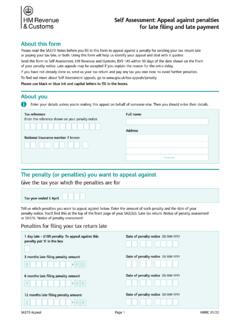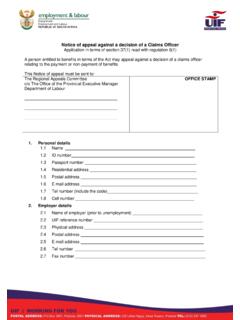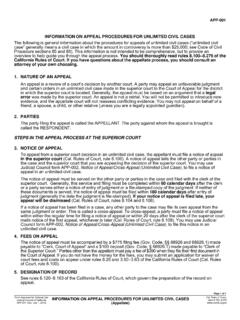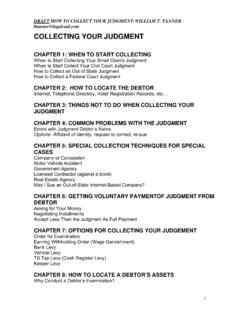Transcription of How to appeal against a Child Maintenance decision made …
1 SSCS2A. How to appeal against a Child Maintenance decision made by the Department for Work and Pensions 1. About this guide The aim of this guide is to help you if you wish to appeal against a decision made by the Department for Work and Pensions (DWP) about Child Maintenance . An appeal ' means applying to Her Majesty's Courts & Tribunals Service (HMCTS) for an independent ruling on whether a decision by DWP is correct or not. Your appeal can be considered by a tribunal which belongs to the system of courts and tribunals which decide people's rights. The tribunal deals with disputes about social security benefits. It makes an independent decision on appeals in most cases by means of a hearing. About DWP's decisions The information in this guide applies only to appeals against decisions made by DWP on a claim for Child Maintenance Appeals. It does not apply to appeals against decisions made on other types of benefit, such as Personal Independence Payment, Universal Credit, Employment and Support Allowance, compensation recovery, mesothelioma or NHS.
2 Charges. If you wish to appeal against a decision on one of these types of benefit, you need to use form SSCS1 or SSCS3 or SSCS4 or SSCS6 or SSCS7, respectively. You can find what form to use at: Before you can appeal to the tribunal, you must ask for the decision about your benefit to be looked at again. This is called mandatory reconsideration'. SSCS2A How to appeal against a Child Maintenance decision made by the Department for Work and Pensions ( ). Page 1. 2. What to consider Can I appeal ? You can only appeal where the law gives you a right of appeal . Not every decision made on Child Maintenance carries a right of appeal . When you get an official letter giving a decision , it must say whether you have a right of appeal against that decision . This is a legal requirement placed upon DWP. As a broad guide, decisions on whether there is liability to pay for a Child , and if so, how much do carry a right of appeal . Decisions about administrative matters, such as how or when payment is made, do not carry a right of appeal to the tribunal.
3 Your letter should state clearly whether you have the right of appeal against the decision that has been made. If, however, the decision letter says you do not have a right of appeal , but you think that DWP have made a mistake and you should have the right of appeal , you can send your appeal to HMCTS and get a legal ruling as to whether there is a legal right to hear your case. You may want to discuss this issue with DWP first. If you do this, you must make it clear in the grounds for your appeal that you believe that you have the right of appeal and why you have that right. This will allow HMCTS to identify your point of dispute and take the necessary action. If the tribunal rules that you do have a right of appeal , the appeal can go ahead. If, on the other hand, the tribunal rules that you do not have the right to appeal to a tribunal against that decision (that is, your appeal is out of jurisdiction'), your appeal ends there. These types of cases are unusual, and it is best to seek advice from someone with knowledge or experience to make sure you are correct.
4 Other remedies may be available through the courts and you may need to take advice about this. Should I appeal ? This guide deals with how to appeal . It cannot tell you whether you have a good case or not. HMCTS staff will be happy to help with telephone, email or webchat queries about your appeal as it goes through the process, but they cannot give you an opinion about whether you are likely to win or lose, or whether you should take a particular step or not. This is a decision for you. You may be able to get advice on whether you have a good case from a Citizens' Advice Bureau, welfare rights service, advice centre, law centre, solicitor or trade union. Some may be willing to help you prepare your case and attend the tribunal hearing with you. You can find out about sources of help from: Yellow Pages;. Local council information services;. Some people who appeal choose to get professional advice and support with it. Page 2. If you do decide to get advice, please do so at the earliest opportunity when you are thinking about appealing.
5 Please do not leave it until your appeal is well under way. If you face a delay in getting advice (busy advice centres may not be able to give you an appointment straightaway), please make a note of the time limit for appealing (see section Time limits'). If the time limit is imminent, you should not delay making your appeal while you are seeking advice. In deciding whether to appeal or not, you also need to know what the tribunal can and can't do for you. Tribunals do not have unlimited powers. They can only do what the law gives them power to do. A tribunal has the power to decide whether there is a liability to pay for a Child and, if so, what is the amount of that liability, and which parent should pay it. The tribunal can replace the decision you are appealing against with the decision they decide should have been made. The tribunal cannot: Change the law. The tribunal has to apply the law as it stands, even if that leads to an outcome that you think is unfair; or, Deal with administrative complaints, like delay or lack of courtesy.
6 If you think you have received a poor service from DWP, you should take that matter up with their customer services. 3. Making your appeal The Law The law has certain rules about appeals and HMCTS can only accept your appeal if it meets these legal criteria. Your appeal must: Be made in writing;. Be in English or Welsh;. In most cases, include a copy of the mandatory reconsideration notice if you are sending your appeal by post (or notices, if there is more than one);. Give reasons for the appeal ; and, Be signed by you, unless DWP or a court has appointed someone else to act on your behalf. If your appeal does not meet all these criteria HMCTS may have to return it to you and may not be able to consider your appeal at all unless you provide these details. Page 3. You will need to tell us the date of your mandatory reconsideration letter (section 2 of the SSCS2 form) and include a copy of your mandatory reconsideration notice when you send your appeal form to HMCTS.
7 Because of the legal requirement to include specific information, HMCTS strongly recommend that you use an appeal form to make your appeal . The form helps you gather the right information in a step-by-step way and it has a brief checklist to prompt you on what to do. Details of where you may obtain it are provided overleaf, and on The form also asks you questions about what type of hearing you would like, any dates you would like us to avoid and whether you have any special needs. If you prefer, you can still make your appeal just by writing a letter, but you risk missing out some of the information the law requires. Also, HMCTS may have to write out to you separately to ask about your hearing requirements and availability and this creates a delay in the process. If you want to appeal by writing your own letter, use the appeal form as your guide and include in your letter all the things that the appeal form asks for. Time limits For social security appeals you have one calendar month in which to appeal , starting from when you get your mandatory reconsideration notice.
8 Your appeal is not regarded as made, until it has been received by HMCTS. For example, if the letter giving the decision is sent to you on 15 March, your appeal must arrive in HMCTS by 15 April at the latest. If you find yourself outside the time limit, you must give reasons why the appeal is late. If you do not provide reasons your appeal may be returned to you. There is a special section on the appeal form where you can give reasons for lateness. Please remember, if the time limit is very soon your appeal may be late by the time it arrives in HMCTS, even if it is not late on the day you post it. If DWP do not object to the reasons for your appeal being late it will generally proceed as though it was received in time. We will write to you if DWP object to your appeal being late. The appeal form There are different types of appeal forms, depending on the type of benefit decision you are appealing against . To appeal a Child Maintenance benefit decision , you must download and fill out a SSCS2 form.
9 You can obtain forms at: You can also visit local independent advice agencies who may stock the form. Page 4. If you need advice on completing the appeal form you may call or email HMCTS on 0300. 123 1142 or at if you live in England or Wales, or 0141 354 8400. or at if you live in Scotland. Welsh speakers can call 0300. 303 5170. 4. Completing form SSCS2. For information on completing the SSCS2 form for Child Maintenance appeals, please read the guidance in this section. Otherwise, you may move onto the section After you send in your appeal '. Child Maintenance appeals cannot be submitted online. You will need to download a copy of the SSCS2 form. You will also need to tell us the date of your mandatory reconsideration letter (section 2) and include a copy of your mandatory reconsideration notice when you send your appeal form to HMCTS. Not all parts of the form need to be completed by everybody. People making appeals have different circumstances, so you may find that you only need to complete some sections of the form.
10 Everyone, however, must complete Sections 1, 2, 3, 5, 6, 7, 7a and 10 of the SSCS2. form. You should use black ink to complete the form. This is because the form must be scanned or photocopied by HMCTS and sent to DWP. Coloured ink, even blue ink, does not show up well in scans or photocopies. You should also complete the form using BLOCK CAPITALS so that all the important details are clear unless the section on the form tells you otherwise. Section 1: Your details This section is all about you. When we are referring to You' we mean the person who is making the appeal . Here we need you to tell us who you are and where you live so that we can write to you, and so that DWP can identify who you are when we ask them to explain why they came to their decision in your case. In this section you will need to: Give your title, first name(s) and surname;. Give your date of birth;. Give your national insurance number;. Give your address;. Give your daytime phone number; and, Give your mobile phone number (if you have one).















